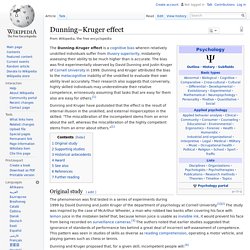

Dunning–Kruger effect. The Dunning–Kruger effect is a cognitive bias wherein relatively unskilled individuals suffer from illusory superiority, mistakenly assessing their ability to be much higher than is accurate.

The bias was first experimentally observed by David Dunning and Justin Kruger of Cornell University in 1999. Dunning and Kruger attributed the bias to the metacognitive inability of the unskilled to evaluate their own ability level accurately. Their research also suggests that conversely, highly skilled individuals may underestimate their relative competence, erroneously assuming that tasks that are easy for them also are easy for others.[1] - StumbleUpon. - StumbleUpon. English language did you knows. Plato of Athens - The Republic - Squashed Philosophers Abridged Edition.